By Professor Elizabeth Crooke, Principal Investigator, Museums, Crisis and Covid19.
The past year has been an opportunity for the museum sector to engage in deeper thinking around their roles as place making institutions – that was the key message coming from the NI Museums Council Museum Forum (23 March 2021), co-chaired by Prof Elizabeth Crooke and Sinead McCartan (NIMC).
NI Museums Council is Project Partner on Museums, Crisis and Covid19 and, one year into the pandemic, focussed its annual Museum Forum on ‘Museums Beyond Covid’, exploring future planning for the sector
Museums at the heart of communities
A reassuring message for everyone working in and with museums came from Maeve Walls, Director of Culture, Department for Communities (DfC). DfC provides government support for National Museums NI, NI Museums Council and other parts of the heritage and arts sector. The importance of museums was reiterated and Walls described museums as at the ‘heart of bringing our communities back’ to realising their full potential.
Museums are identified as central to key strategies within DfC: anti-poverty, wellbeing, climate change and inclusive growth; and partnerships across the heritage and culture sectors are recognised as key to delivering positive outcomes in these areas.
Likewise, Paul Mullan, Director National Lottery Heritage Fund, emphasised the contribution that museum and heritage spaces make in connecting people to their communities and stories of place.
Heritage rediscovered during lockdown
CEO Margaret Henry shared research recently completed by Thrive Audience Development which demonstrated that as we continue to live with the impact of Covid19, museums and heritage sites have a lot to give. Their visitor research suggests audiences have experienced museums as enriching our understanding of the world and our locality.
Heritage spaces are forging identities, values and a sense of place. During 2020, people, working from home or on furlough, were discovering, or rediscovering, heritage on their doorstep. Further to that, online engagement has provided new opportunities to learn more about local, national and international heritage. In this respect, Covid19 has given digital transformation a kick-start, and Anra Kennedy of Culture24 suggests museums should harness the current momentum.
As identified by Rosemarie McHugh, Tourism NI, digital engagement with museums and heritage feeds both local and international awareness and a desire to travel. McHugh described museums as providing visitors with ‘authenticity and compelling stories’. Clearly, appetites have been whetted and museums in all their diversity are central to developing this further.
Museum collections "can bare witness" and "provide solace" at times of challenge.
Lynn Scarff, Director of National Museum of Ireland.
Museums adapting to the impact of Covid
Museums have adapted in significant ways in 2020 and change will continue to be part of the museum environment in months and years to come. It is evident that the pause forced on the sector in the past year has been a time to recalibrate.
Director of the National Museum of Ireland, Lynn Scarff reflected that museum closures led curators to reflect more deeply on the relevance of the institution’s contemporary offer. Operational matters were key in 2020 and will continue to be so. Of equal importance is staff and audience wellbeing. Further to that is the value offered by collections, which Scarff reminded us ‘can bare witness’ and ‘provide solace’ at times of challenge.
Exploring new ways to capture impact
A clear message from the National Museum of Ireland, Culture24, and the contributors from the Northern Ireland sector, is that in the coming months, which may stretch into years, we will need to consider new ways to capture impact, engagement and experience. With a diminished international tourist market, and local visitors keen return to their museums (but likely to be cautious in equal measure) museums will need to look again at that the idea of the porous museum.
Graham Black (2021) refers to the porous museum as one that brings new power to the museum; an approach that is more collaborative, democratic, team-driven, that has dispersed decision making, and shares power beyond the museum.
Now more than ever we need to explore what beyond the museum (building) means. The examples of practice shared at the NI Museums Council Museum Forum, and research findings in the opening months of this Museums, Crisis and Covid19 AHRC-funded Rapid Response project, provides evidence this new approach is emerging.
We suggest there’s an urgent need to nurture it further amongst new, diverse audiences. In the new era that has been accelerated as a result of Covid19, we now must now prioritise this action through the multi-platform porous museum.
Do you work in or visit museums? We are keen to know more about your experiences over the past year. Please contact Museums and Covid19 Research Associate Dr Pete Hodson p.hodson@ulster.ac.uk to share your stories and ideas for museum futures.

















